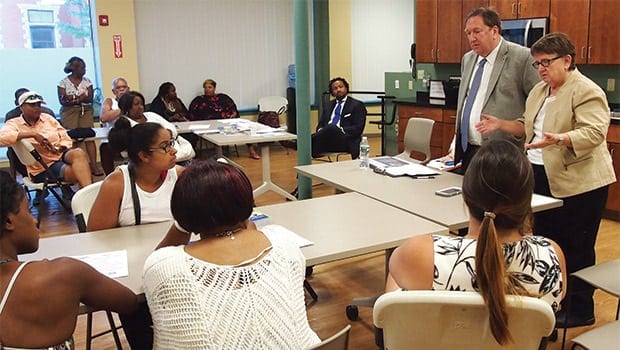Effort underway to rein in sober homes
Legislation paves way for certification

State officials hope a voluntary certification system governing the operation of sober homes in Massachusetts will help increase safety and curtail abuse in the unregulated market for the group homes. But a group of Roxbury neighbors who turned out for an information session on the new standards for the homes were less optimistic.
“I have a sober home on my street that just sprouted up with no notice,” one woman said during the meeting. “They’re doing more drug deals there than a little bit. The person who runs it is a convicted felon.”

State Rep. Evandro Carvalho and McGahan.
State representatives Liz Malia and Evandro Carvaho and City Councilor Tito Jackson attended last week’s meeting, along with about 20 community residents. While many community residents voiced concerns about the proliferation of group care homes in Roxbury, the officials expressed cautious optimism that the new regulations could rein in irresponsible sober home operators.
Sober homes are residences ostensibly set up for people who are fighting alcohol and/or drug addiction. While there are no government standards — local, state or federal — that govern their operation, they are protected under the Americans with Disabilities Act and federal fair housing laws because alcohol and drug addiction are considered disabilities.
State sanction
Typically, individuals who commit drug-related crimes are discharged to sober homes by probation officers or judges as a condition of their release. In Boston and communities across Massachusetts, the homes have been plagued by allegations of mismanagement and abuse. Some sober homes have had residents suffer fatal overdoses and many, neighbors say, have become magnets for people who engage in public drinking, drug dealing and drug use.
Tenants typically pay weekly rents that officials say average $200. Any property owner can open their house for use as a sober home, regardless of their ability or willingness to manage tenants in recovery — or in remission from alcohol or drug abuse. State officials do not know how many sober homes are in operation around the state.
A closer look
Guidelines
Among the certification standards MASH is requiring for sober homes to receive referrals are provisions that would require that sober homes:
Be guided by a mission and vision
Adhere to legal and ethical codes
Maintain records of residents’ payments, charges and deposits
Provide documentation that owner/operators have current liability insurance
Document that there are no taxes or other municipal assessments or liens on the property
Demonstrate that residents participate in the development of their recovery
Create and sustain an atmosphere of recovery support
Ensure that staff members are trained in MASH standards and practices
Maintain policies and procedures for supervision of staff
Under the new certification system, sober home operators voluntarily registe their addresses with the state and obtain certification if they comply with legal and ethical codes developed by two nonprofits: the Massachusetts Association for Sober Housing and the Recovery Homes Collaborative. The criteria for certification include agreeing to limit the number of beds in a home and participation in annual training for sober home operators.
Sober homes that do not register with MASH will stop receiving referrals from the state September 1.
“You either fall in line and comply with the regulations or you’re not getting referrals,” said John McGahan, President and CEO of the Gavin Foundation, a nonprofit that provides community-based substance abuse treatment, education, and prevention. “What we hope will happen is that when they stop getting referrals, they’ll close.”
Outreach
A staff person and volunteers working for MASH — an organization McGahan heads — are conducting the certification process and will be responsible for responding to complaints and handling decertification of sober homes that do not comply with the state regulations.
McGahan said residents of sober homes and abutters can file grievances with MASH, which would trigger a visit from an inspector. If the sober home is found to be out of compliance with the organization’s certification standards, it can have its certification revoked and lose the referrals.
Rep. Malia said the certification standards are the state’s first effort to regulate sober homes. Problems with sober homes first came to the attention of Malia and other elected officials when an operator opened several on Washington Street in the Highland Park area. Problems at that location included overdoses, vagrancy, overcrowding and public drinking.
“What we learned then is that there weren’t any regulations that encompassed folks who were running sober homes,” she said. “This is not a perfect solution. It’s a beginning.”
So far, 36 sober home operators with a total of 800 beds have registered with MASH. Officials do not know how many homes there are in total, since the operators are not required to register with state or local authorities. In addition to homes operating in Roxbury and Dorchester, McGahan said there are homes in communities including Lynn, Chelsea, Fall River and Cape Cod. Few have registered from other regions of the state.
Carvalho acknowledged that the new certification system might not alleviate all of the abuses of the sober homes currently operating in Massachusetts, but said the registration system would provide a strong incentive for them to be run in a more responsible way.
“This is a step forward to make sure that those who come our way are certified and well-run, and hopefully to weed out the bad apples.”







